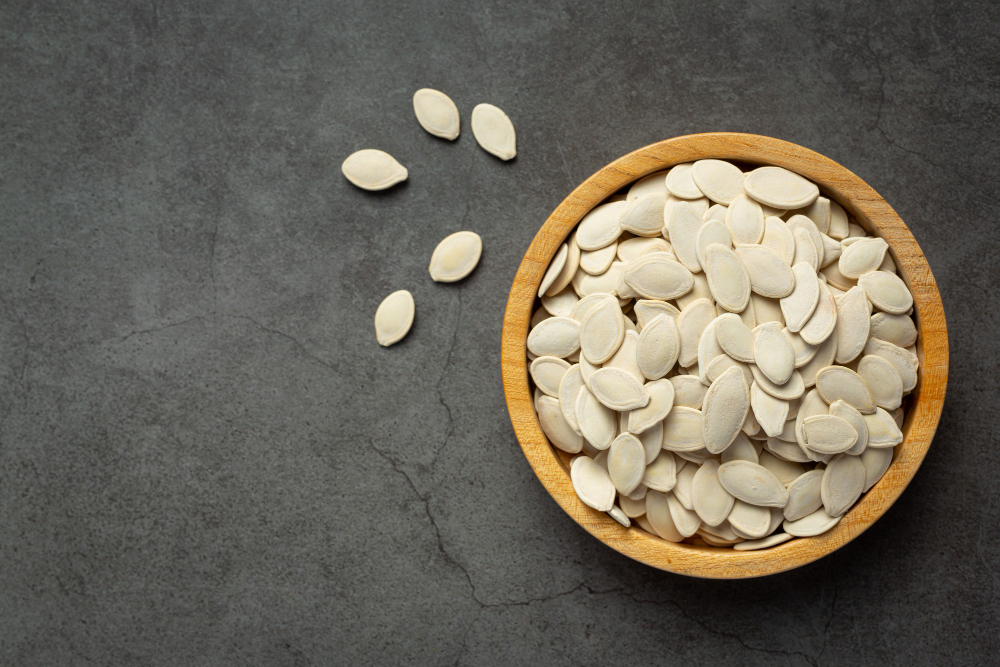When you carve your Halloween pumpkins or when you’re baking a pumpkin pie from scratch, don’t forget to keep the pumpkin seeds for eating.
Pumpkin seeds are edible seeds, also called pepitas. They can be eaten roasted, and can be made into an affordable nut-free spread for people with allergies.
Use the following recipes for creating a delicious and healthy snack or spread!
Pumpkin Seed Butter
What You’ll Need
2 cups of raw pumpkin seeds
1-2 tablespoons of oil (coconut, olive, or avocado oil work well)
Salt to taste
Optional: Honey or maple syrup for a touch of sweetness
Instructions:
Preheat your oven to 350°F (175°C). Spread the pumpkin seeds out on a baking sheet and roast them in the preheated oven for about 10-15 minutes, or until they begin to turn golden brown. Stir occasionally to ensure even roasting.
Allow the pumpkin seeds to cool for a few minutes. Then, transfer them to a food processor or high-powered blender.
Begin processing the seeds. They will first turn into a crumb-like texture, but continue processing.
After a few minutes, add in the oil, starting with one tablespoon. If needed, add more oil to achieve a smoother texture.
Continue to process until the seeds turn into a smooth, creamy butter. This may take up to 10-15 minutes depending on the strength of your processor or blender.
Once you’ve achieved the desired consistency, add salt to taste. If you want a sweet pumpkin seed butter, add a bit of honey or maple syrup and blend again to incorporate.
Transfer your homemade pumpkin seed butter to an airtight container and store it in the refrigerator. It can be kept for up to 2 weeks.
Enjoy pumpkin seed butter on toast, in smoothies, or as a dip for fruits and vegetables. It’s a delicious and nutritious alternative to traditional nut butters. Enjoy!
Other Pumpkin Seed Recipes
Follow the roasting instructions above to create the following roasted pumpkin seed recipes.
Savory Toasted Pumpkin Seeds: Toast the seeds in a pan with a little oil until they’re golden, then season with your favorite savory spices like garlic powder, onion powder, and a bit of salt (source: Allrecipes).
Cinnamon Sugar Pumpkin Seeds: Toss the seeds in a mixture of cinnamon, sugar, and a little bit of oil, then roast them until they’re crispy. They make a sweet and crunchy snack (source: Joyfoodsunshine).
Spiced Pumpkin Seeds: Mix the seeds with a spicy seasoning blend, such as harissa, curry, or chili powder, along with a little oil, and roast them (source: Inspiredtaste).
Caramelized Spicy Pumpkin Seeds: Add some heat to your sweet snack by tossing your pumpkin seeds in caramel and a spicy seasoning, then roast them until they’re caramelized (source: Allrecipes).
Ranch Pumpkin Seeds: For a twist on the classic roasted pumpkin seed, toss your seeds in dry ranch seasoning before roasting (source: Swankyrecipes).
Pumpkin Risotto: Use pumpkin seeds as a garnish on a creamy pumpkin risotto. The seeds add a nice crunch and complement the flavors of the risotto (source: Thepioneerwoman).
Nutritional Data
One ounce of pumpkin seeds supply 37% of the recommended daily intake of magnesium, which is helpful, as many people’s diets lack this important nutrient. The right amount of magnesium supports healthy glucose levels, lower blood pressure readings, and improved bone and heart health.
Moreover, pumpkin seeds are helpful for anyone who experiences arrhythmias, inflammation, or issues with their cholesterol. Besides magnesium, the seeds are a rich source of zinc and fatty acids, all of which are good for keeping the heart healthy and the body free of disease.
Calories and and Major Nutrients
An ounce of pumpkin seeds contains the following:
- 150 calories
- 12.8 grams of fat, including 4.0 grams of monounsaturated fat, 5.9 grams of polyunsaturated fat, and omega-3 and omega-6 fatty acids, all of which are beneficial to a person’s overall well-being
Seeds only contain a small amount (or 2.4 grams) of saturated fat.
Other significant nutrients include:
- 6.9 grams of protein
- 5.0 grams of carbs, including just over a gram of fiber and 0.3 gram of sugar
- 18% of the daily value of Vitamin K
- 37% of the daily value of magnesium
- 33% of the daily value of phosphorus
- 14% of the daily value of zinc
- 19% of the daily value of copper
- 42% of the daily value of manganese
Why Pumpkin Seeds are So Good for the Heart
Pumpkin seeds are considered exceptionally heart-healthy because they are loaded with nutrients that stabilize blood flow and vascular functioning.
Antioxidants: Pumpkin seeds are rich in antioxidants like carotenoids and vitamin E. Antioxidants reduce inflammation and protect your cells from harmful free radicals, thus reducing the risk of heart disease.
Magnesium: Adequate magnesium intake is associated with a lower risk of hypertension and atherosclerotic vascular disease, conditions that can lead to heart disease.
Zinc: Zinc is critical for maintaining heart health as it contributes to protein synthesis, wound healing, and DNA synthesis, all of which are vital for the health of the heart’s cells.
Fatty Acids: Pumpkin seeds are a good source of monounsaturated and omega-6 fats. These healthy fats reduce bad cholesterol and increase good cholesterol, thus reducing the risk of heart disease.
Fiber: Pumpkin seeds are a good source of dietary fiber. High-fiber diets are associated with a lower risk of heart disease.
Eat pumpkin seeds as part of a healthy diet and exercise plan – one that includes a variety of vegetables and fruits, and lean proteins and grains. Always consult with your doctor before making any major changes to your diet, especially if you have an existing heart condition or you’re being treated for another health concern.
By: Donna Ryan
Author Bio: Donna Ryan is an experienced writer, journalist, and editor. You can contact her at inkypub.com about writing services. She ghostwrites biographies and e-books and writes scripts for YouTube as well as book and product reviews.





